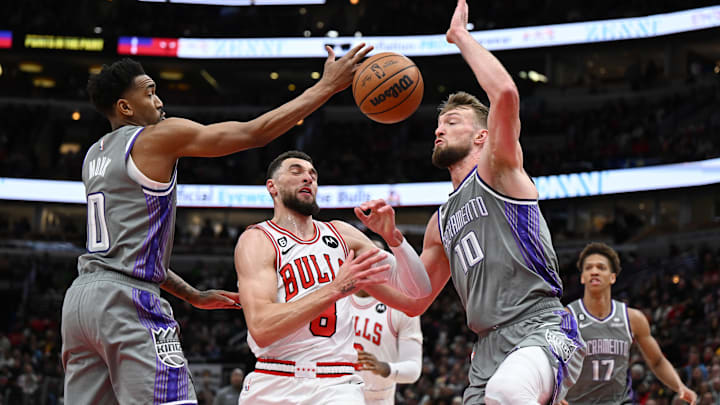It’s well known at this point that the Chicago Bulls would like to trade Zach LaVine and the feeling seems mutual.
Finding a trade partner is another matter, as the Bulls haven’t been able to create much of a market for LaVine, though that could change after free agency when teams that struck out start searching for plan B.
The Sacramento Kings are a team that has been connected to LaVine, though that market may have taken a hit.
The Kings re-signed Malik Monk to a four-year deal, which could take them out of the LaVine market according to Mike Scotto of HoopsHype:
"Looking ahead, the Bulls are continuing to search for a new home for guard Zach LaVine, league sources said. Some rival executives believed the four-year, $78 million agreement with Malik Monk would take Sacramento out of any LaVine talks. "
But he added a caveat which leaves open the possibility that the Bulls and Kings will eventually find a deal:
"As previously reported by HoopsHype before the trade deadline, Kings guard Kevin Huerter, also a trade candidate, has admirers in Chicago’s front office. "
Even with Monk, the Kings may be able to squeeze LaVine in if they can get off a contract or two, but is this a deal the Bulls could stomach?
Chicago Bulls trade Zach LaVine to the Sacramento Kings for Kevin Huerter and Trey Lyles
The Kings would need to so some financial maneuvering to take on LaVine’s contract, as they already have a lot of money tied up in Fox, Sabonis, Barnes and Monk.
Chicago would still come out of this trade with around $20 million in cap space after taking on Huerter and Lyles, who are both useful role players on reasonable contracts. Lyles only has one year left on his deal and Huerter has two, so the Bulls would be cleared of an extra year of salary.
Huerter would give Chicago a shooting boost and Lyles is a serviceable backup big.
Would the Kings give up both and still take on all three years of LaVine? They may want an asset to do so given that there aren’t teams lined up to trade for him.
If the Bulls want to move LaVine this summer, it will come down to how little they can stomach in return, which may require patience for a later market to develop.
